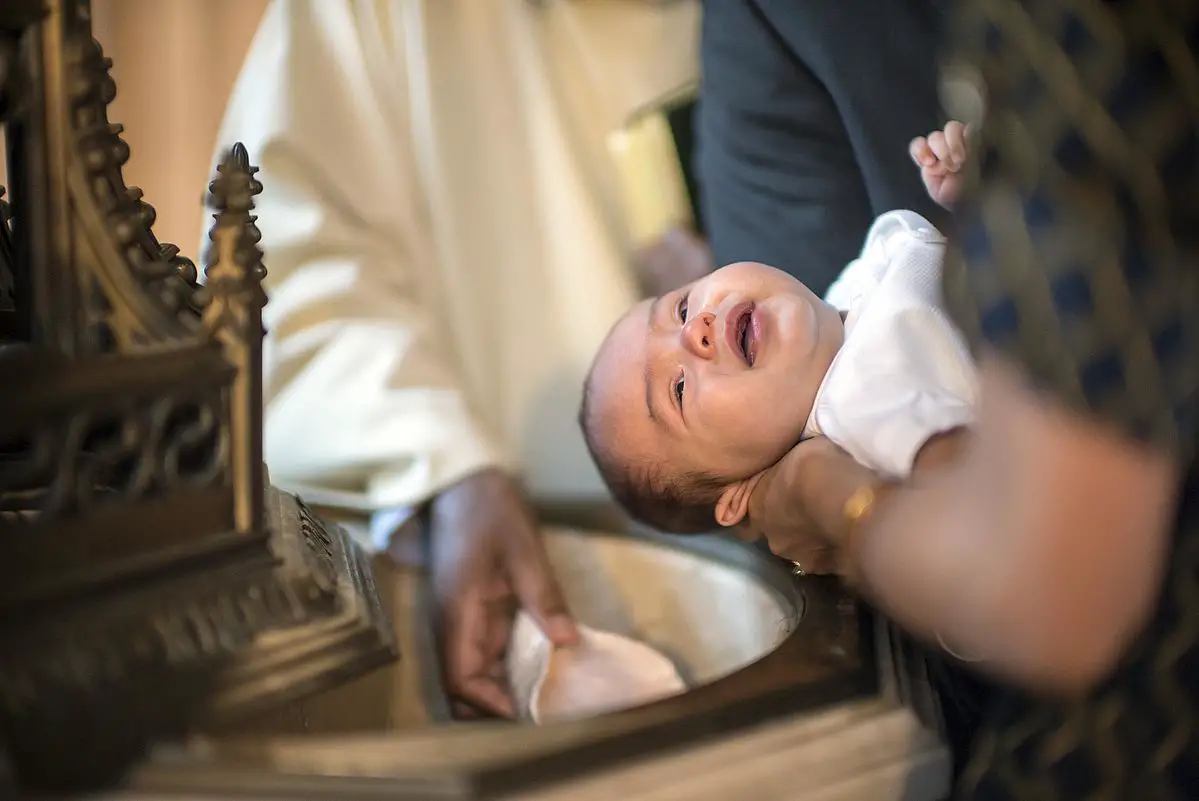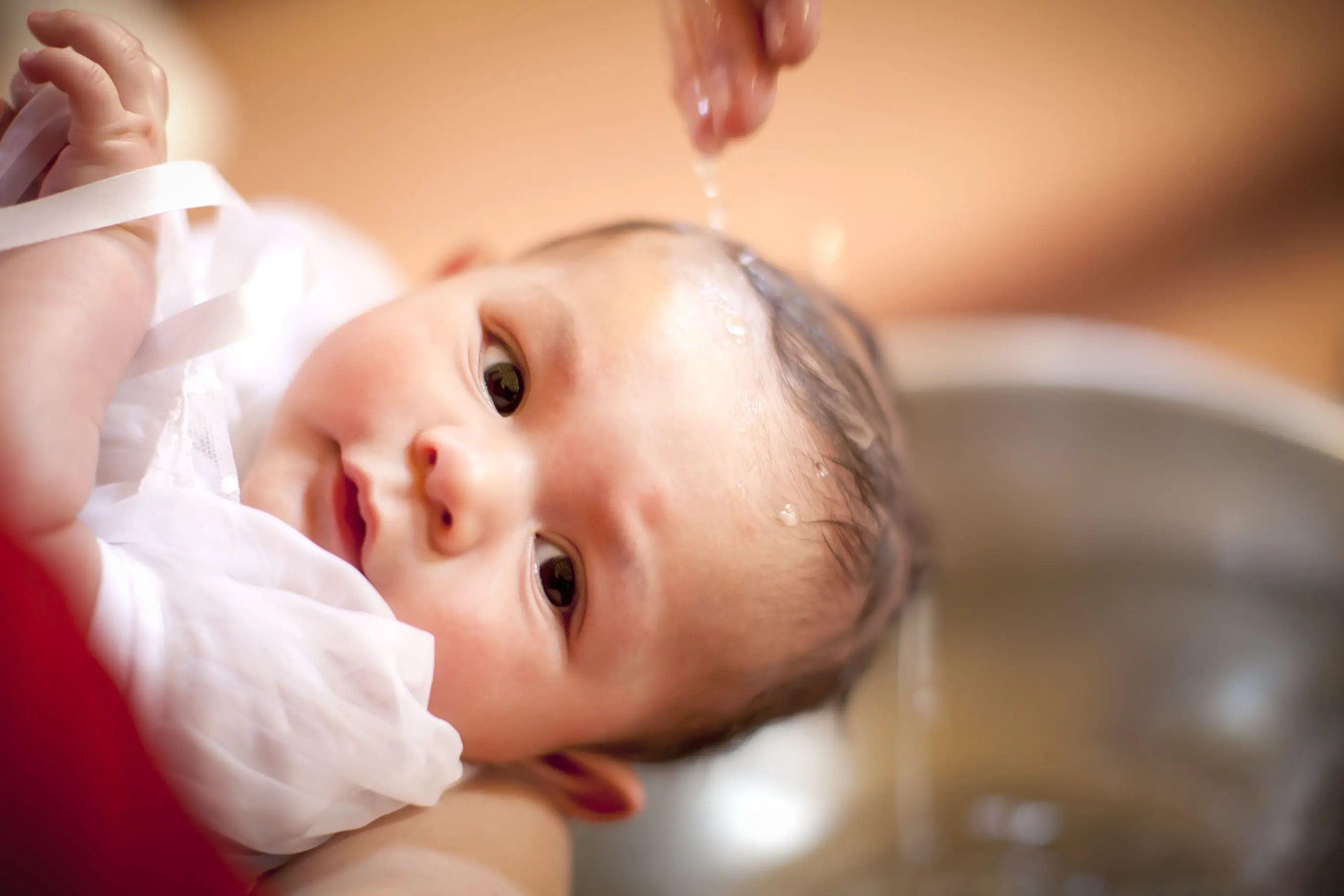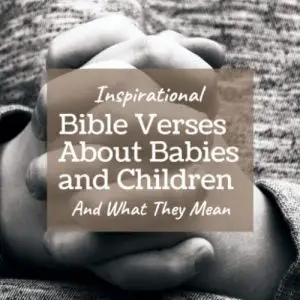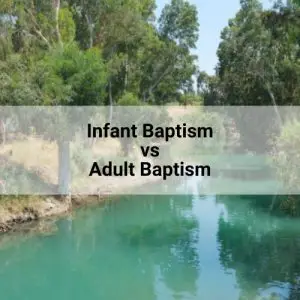Picture this: You’re standing in a Roman-Catholic church, holding your baby. Light trickles in through the stained-glass windows, casting rainbow shadows on everything around you. Your little one wears an embroidered white gown over a hundred years old, the same gown her mother, grandmother, and great-grandmother were baptized in. Everyone you love is there, your family and closest friends. They say prayers for your baby and pronounce blessings over her future.
A priest in white and gold vestments beckons you forward with your partner. You stand with the priest in front of a clear basin of holy water. He makes the sign of a cross on your baby’s forehead with a special oil, then dips a bowl in the holy water, carefully pouring it three times over the top of her head as you hold her over the basin. As he pours, he says, “We baptize you in the name of the Father, the Son, and the Holy Spirit.” Your heart leaps with joy as your daughter completes her baptism, joining all the women in your family before her.
Table of Contents
What it really means
But what does a baptism really mean for your baby? Why do some Christians baptize their children in the first place? This article should provide you with everything you need to know about this unique religious practice.
Most experts associate the idea of baptism as we know it today as beginning with John the Baptist, the biblical prophet who famously baptized Jesus of Nazareth before he started his ministry.

The word “baptism” is a transliteration of the Greek word BAPTIZO which means to immerse. In Hebrew, it is referred to as a MIKVEH – an immersion (1). Digging deeper shows baptism has roots in the Jewish purification rituals found in Leviticus 16. The difference being the Levitical Baptism dealt primarily with ritual purification, while John’s baptism dealt with repentance: the changing of one’s life by turning away from sins. Baptism is significant to the Christian faith.
Jesus Christ was Baptized by John, saying “It should be done, for we must carry out all that God requires.” (Matthew 3:15). The early Christian church upheld the importance of baptism and its symbolism of being united with Jesus. As Paul said in Romans. “Therefore we are buried with him by baptism into death: that like as Christ was raised up from the dead by the glory of the Father, even so, we also should walk in newness of life.” (Romans 6:4)
Theologically speaking, most Christian denominations agree that water baptism is only considered to be ceremonial—a public expression of a person’s saving faith in Jesus Christ. So how does that relate to your baby? A newborn can’t even publicly express its love for its parents, much less the God of the Bible. Still, infant baptism has had a place in some Christian denominations for centuries.
Here are a few quick facts about the practice:
Baptism vs christening
The words ‘baptism’ and ‘christening’ are often used interchangeably, though, in reality, they usually refer to two entirely different things. A christening usually refers to a naming ceremony for newborns common in the Catholic and other Anglican churches, whereas an infant baptism, like its adult counterpart, represents a deliberate act of identification with the person of Jesus Christ and his Church (2).
Some reforming Protestants did away with infant baptism, believing baptism to be something that a person should do of their own free will after confessing of their sins and repenting (3).
The christening ceremony varies between denominations, but there are usually some common rites involved, including special clothing, prayers, anointing with sanctified (blessed) oils, sprinkling, pouring, or partial immersion in holy water, and the lighting of a special candle at the end. The general purpose of baptizing babies across most denominations seems to be dedicating their lives and futures to God and His purposes. (If you’re looking for something special to give for a christening or baptism, may we suggest the Stuff4Tots Bible Verse Quilt.)
The Church of England says children may be baptized at any age, but christening for newborns traditionally takes place within their first few months. In the Catholic tradition, christened children are sometimes given new Christian names during the ceremony. These names are often those of famous biblical figures, saints, and even angels. The naming of Godparents is also common. They are usually close friends or relatives of the parents. The role of the Godparent is to assist in raising the child both physically and spiritually.

Of the dozens of Christian denominations in practice, those that typically baptize/christen children include but aren’t limited to:
- Catholics,
- Eastern and Oriental Orthodox,
- Anglicans,
- Presbyterians, and
- Lutherans.
If you grew up in one of these churches, you’ll know a lot of this information already, and probably more.
But if you didn’t, this next part is for you!
Let’s say your ex-husband converts to Catholicism and wants to get your baby christened, or you and your partner decide to join a local church and they require your entire family to be baptized. Infant baptism, if done properly by a professional, is completely harmless, but you should definitely be aware of a couple things if you’re considering baptizing your baby.
Be inspired with bible verse quilts on Amazon.
Concerns to consider
There are some things concerning child baptism that you should be aware of before you go through with it.
Baby immunity
Your newborn’s immune system won’t be strong enough to handle airborne pathogens until somewhere between 6 and 8 weeks of age.
If you take your little one out before they’re ready, to a church, mall, or any large open room with poor ventilation, you’re increasing their chances of coming down with something nasty. You wouldn’t want to end your christening with a trip to the pediatrician, so bear that in mind.
Full immersion
Be wary of any baptismal ritual that requires total immersion of an infant.
I don’t believe this is a common practice any longer, and it has been associated with tragic outcomes in the past.
Just to be on the safe side, if the preacher’s plan is to stick your baby under water, tell him you’ll pass. I’ve heard tales long ago of babies getting sick from germy holy water, but those seem to be just tales.
Most churches have special basins and pumping systems for their baptismal water. (Some of them are even heated so you don’t have to splash cold water on your little one!)
Full information
You’ll also want accurate information about exactly what you or your children will be committing to by performing the baptismal ceremony. Here’s a few ways you can go about getting that info.
The Church’s Statement of Faith/By-Laws
Nearly all churches have them, usually on their website for easy accessibility. The Statement of Faith is a document that explains exactly what the beliefs are of the church for anyone interested in joining. Most churches have a section in the Statement of Faith that specifically explains their beliefs on baptism.
Ask A Pastor
No duh, right? If anyone would know it’d be the guy or gal that runs the place. If you’re not much of a reader, it may be better to go straight to the head honcho.
He or she will be able to tell you exactly what they believe about baptism and answer any questions you have. You’ll also be able to get a feel for the person running the church where you’ll be raising your child spiritually.
Sit In On A Ceremony
Most churches have ‘Baptismal Sundays’ or Saturdays, or Wednesdays, basically a day that is dedicated to baptizing.
If you’re still not convinced after reading the Statement of Faith or talking to a pastor or priest, why not go observe the ritual yourself?
Bring a notepad and pen, pay careful attention to what the preacher is saying. Some churches record their services so you can watch them online.
This would be better suited to older children considering baptism than infant baptism. If you’re hoping to observe an infant baptism/christening, you’ll likely have to be invited. Or, you know, pull up a video of one on YouTube.
What should you do if you’re a non-believer?
You might also wonder what you should do if a spouse or family member wants your baby to be baptized . . . and you don’t necessarily believe in that sort of thing. Here is the advice I would give in such a case:
Be supportive.
Don’t immediately dismiss their choice or react with disdain, but don’t blindly condone it either. Find out everything you can about their motivations in a gentle, caring way. Don’t assume. Really listen. You may learn something about them you didn’t know.
Be honest.
After you’ve heard their side of the story, tell them yours. Honestly sharing your feelings about their choice will ensure you don’t end up in a situation that makes you uncomfortable and leads to conflict later down the road.
Looking for the perfect infant gift online? Click here to check it out on Amazon.
Finally, Show Love!
Even if you don’t believe in the religious aspects of an infant baptism, going through with one won’t have any long-lasting harmful effects on your newborn.
Having a christening for your baby for the sake of your mother or grandmother, even if you aren’t the most religious person, could be a wonderful opportunity to show love and respect for that person and their beliefs.
Infant baptisms/christening are a big deal for some families. They consider it a unique, once in a lifetime cause for celebration. So . . . celebrate with them! Go out to eat, get them a gift, go to a movie! And as mature adults, we know we don’t have to agree to get along and love each other.
Related Articles:

Adam MacDaniels
A dad of two little girls plus he's a trained Paramedic and a Firefighter. Is there anything that Adam MacDaniels can't do??





